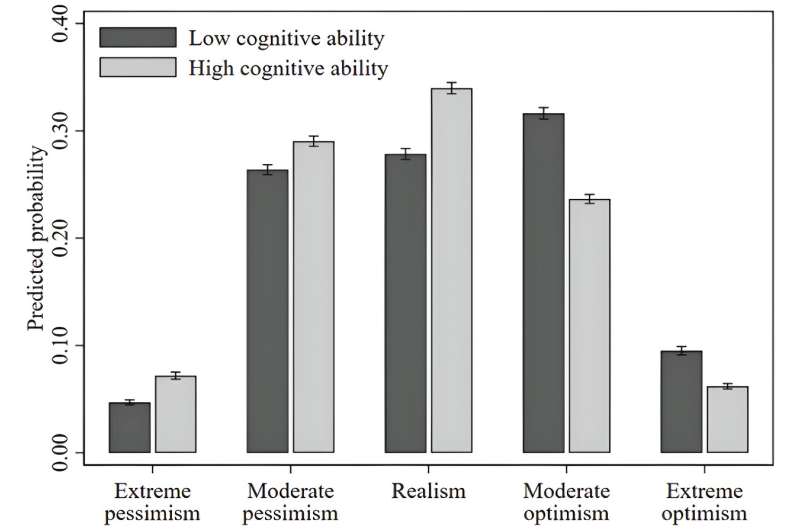November 23, 2023 report
This article has been reviewed according to Science X's editorial process and policies. Editors have highlighted the following attributes while ensuring the content's credibility:
fact-checked
peer-reviewed publication
trusted source
proofread
Higher levels of financial optimism associated with lower levels of cognitive ability

A behavioral economist at the University of Bath in the U.K. has found evidence linking higher levels of unwarranted financial optimism with lower levels of cognitive ability. In his study, published in the journal Personality and Social Psychology Bulletin, Chris Dawson surveyed thousands of people in the U.K. about their economic outlook and compared their responses with their true financial outlook.
Prior research has found links between a sunny outlook and better health and also a higher overall quality of life, including better relationships with people. But it has also shown that being overly optimistic can lead people to make poor decisions, such as how much to save for retirement. In this new study, Dawson looked for an association between unrealistic optimism and cognitive ability regarding financial decision-making.
Suspecting that people with lower cognitive abilities tended to overestimate their financial acumen, and thus make poor financial decisions, Dawson accessed the data repository of the Understanding Society project, which conducted a longitudinal survey involving more than 40,000 households in the U.K. and Northern Ireland over the years 2009 to 2021. He also analyzed data from the British Household Panel Survey run from 1991 to 2008.
The surveys queried respondents about their financial situation along with their expectations for the future. And because respondents were queried more than once over the course of the survey, Dawson was able to compare their earlier expectations with how things had actually panned out years later. Also included in the surveys were questions designed to assess several traits associated with cognitive ability, such as memory, word recall, verbal fluency, math ability and abstract thought.
By comparing the results from both parts of the surveys, Dawson was able to compare cognitive ability with financial optimism. In so doing, he found associations between the degree of optimism reported and cognitive ability. Those with higher cognitive abilities tended to be less optimistic, while the opposite was true for those who had lower cognitive abilities.
More specifically, he found that respondents scoring the highest on the cognitive tests were 22% more likely to fall into the category of realists, which Dawson describes as more objective about their financial prospects, than were those falling on the opposite end of the spectrum.
More information: Chris Dawson, Looking on the (B)right Side of Life: Cognitive Ability and Miscalibrated Financial Expectations, Personality and Social Psychology Bulletin (2023). DOI: 10.1177/01461672231209400
Journal information: Personality and Social Psychology Bulletin
© 2023 Science X Network




















